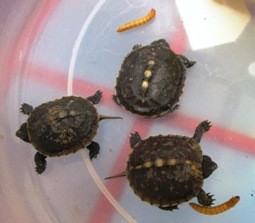What to Do if You Find a Baby Animal Part 1 Baby Rabbits and Baby Turtles
Written by Wildlife Director, Kathryn Dudeck
Spring brings buds, blooms, rains, and lots of calls to the Wildlife Department at CNC about baby animals. While we are licensed and trained only for raptors, reptiles, and amphibians, we respond to over 150 requests each month in spring regarding wildlife babies. Here’s what you can do to help the little ones you may encounter:
Baby Rabbits:
 Did you uncover a rabbit nest while cutting your grass? These nests are simply shallow depressions in the ground with dried grasses and rabbit fur lining. Mother rabbits don’t sleep with their young. Instead, they visit them once a day and once a night to nurse, and then cover them back up. If you have accidentally uncovered one, simply put grass clippings back over the nest, and place a tic-tac-toe pattern of yarn over the area. If the yarn is disturbed the next day, the mother has returned and all is well. If it is still in place, contact a licensed small mammal rehabilitator.
Did you uncover a rabbit nest while cutting your grass? These nests are simply shallow depressions in the ground with dried grasses and rabbit fur lining. Mother rabbits don’t sleep with their young. Instead, they visit them once a day and once a night to nurse, and then cover them back up. If you have accidentally uncovered one, simply put grass clippings back over the nest, and place a tic-tac-toe pattern of yarn over the area. If the yarn is disturbed the next day, the mother has returned and all is well. If it is still in place, contact a licensed small mammal rehabilitator.
If your dog has uncovered the nest, there is a simple way to keep the babies safe. Mother rabbits only enter nests from one side and exit the other. Place a copy paper box upside down over the next, ensuring to cut out the short sides so that she has a clear path in and out. Place bricks or rocks on the box to keep the dog from disturbing it. Please note that mother rabbits do not have “bunny radar” and are unable to locate their nest if it is moved.
If you encounter a baby rabbit whose eyes are open and ears are fully standing up, it is old enough to be on its own.
Baby Turtles:
 Turtles and other reptiles in this part of Georgia have no parental care. This means that from the moment they hatch from the egg (turtles and some snakes) or are born (some snakes), they are 100% self-sufficient. Keep in mind that aquatic turtles nest away from water, so you may encounter hatchling sliders, cooters, and snapping turtles on land. Their instinct is to travel downhill to water once they emerge from the nest. You can gently pick them up and carry them to the edge of the creek or pond if their journeys would require crossing busy roads.
Turtles and other reptiles in this part of Georgia have no parental care. This means that from the moment they hatch from the egg (turtles and some snakes) or are born (some snakes), they are 100% self-sufficient. Keep in mind that aquatic turtles nest away from water, so you may encounter hatchling sliders, cooters, and snapping turtles on land. Their instinct is to travel downhill to water once they emerge from the nest. You can gently pick them up and carry them to the edge of the creek or pond if their journeys would require crossing busy roads.
